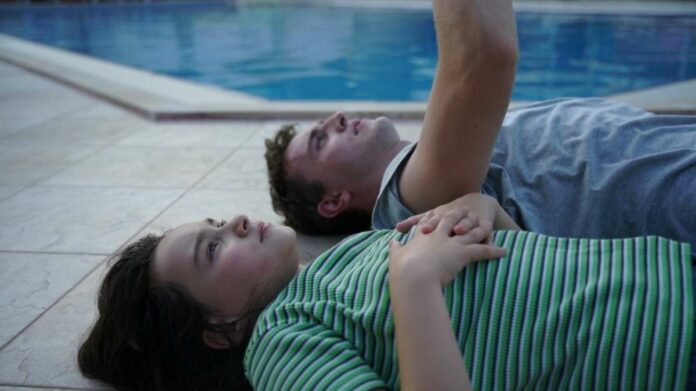How often do we look at a person through worn-out lenses of familiarity, only to realize what we see is nothing but a set of empty notions that reveal more about ourselves than the other? And the living, breathing entity that we yearn to touch lingers like an unattainable goal, surfacing in brief, quiet moments. Charlotte Wells’s 2022 film, “Aftersun,” is a daughter’s memoir about a glorious vacation spent with her father as a child—perhaps one of the few occasions when she lived with him. Calum and Sophie’s relationship unfolds like a series of kaleidoscopic images, as it is eventually disclosed that Calum only exists as ripples in Sophie’s memory.
The brilliance of Wells’s work lies in the ever-changing, ephemeral images that make up the film’s characters instead of tangible definitions. There is barely any exchange of words between them, and yet their silences unravel a universe of emotions. One of the most beautiful sequences in “Aftersun” is the one where Sophie is fast asleep on a bed, and Calum goes out to the balcony by himself. He has an injured arm, struggles a bit to light a cigarette, and manages it somehow. As he takes a drag, he slowly dances to an unheard tune, and this whole scene is orchestrated by Sophie’s gentle snores. Impregnable loneliness holds Calum and Sophie together. It hints at a connection that the father and daughter share that goes beyond words and even their physical presence.
Very little is given away regarding the past and future of the characters. We only know that they are on vacation and they are not used to each other’s presence. There is a subtle element of discomfort that crops up here and there. For instance, when Calum argues with the receptionist for being assigned a room with only one bed or when he apologizes to Sophie for the state of the hotel. And even though they seem to be getting along well, it becomes apparent that they have certain expectations of each other. Not much explanation is provided for Calum’s somber and troubled demeanor. He appears to be a man with dreams, coming to terms with the apathy of life and struggling to find his peace amidst the chaos.
“Aftersun” opens with a scene in which Sophie focuses a camcorder on Calum and asks him what he had been up to when he was eleven years old (her age). This seemingly innocuous question often forms the central premise of this coming-of-age drama. In a tête-à-tête with Sophie, Calum admits that, as a child, he had never imagined life would turn out the way it did. He advises her to be open to all sorts of possibilities and to be happy, not knowing where she might end up. He tells her, “You have time.” Through these words, we get a brief glimpse into the inner world of this young father. This is not only a tale of a child getting acquainted with a new world. Calum is also perpetually evolving and trying to make sense of the world around him. But he is gripped by a feeling of time running out, something that Sophie is quite oblivious to at her age.
The camcorder serves as an essential trope, and its presence can be felt as strongly as if a third entity is looking upon them. One might say that this being merges with the adult Sophie, who is revisiting her memories and in whose mind the audience resides. There might be several other interpretations as well. Both Calum and Sophie are seen recording each other. Even though there are many scenes that convey deep affection between the two characters, the screen that they look at each other through may be suggestive of their distance from each other’s true selves. There is always a lurking possibility that each person is looking at a mirage of the other and enmeshed in his own alienation. But there are passing moments, too, where we might witness a breakthrough, where this invisible wall between the two characters threatens to dissolve. Sophie learns to look at her father not as an ideal but as a man, replete with his own follies and vulnerable in his own way. She shows interest in her father’s love life. She expresses her indignation and embarrassment when her father refuses to sing with her on karaoke night, but again, that is short-lived. Her encounter with teenagers leaves her with questions about sexuality and a certain discomfort surrounding it. She never talks about it with Calum until she is kissed by a friend one night, the experience of which she recounts to her father quite nonchalantly.
Calum’s dream about a dark, crowded dance floor with strobe lights seems to be a transitional space, the significance of which is only understood at the very end. Here, the adult Sophie confronts the thirty-year-old Calum. They are both the same age now, and in a metaphysical sense, they are closer than they could ever be. Adult Sophie is shown to be a grown woman living with her child and her partner. Probably, this confrontation is only a figment of Sophie’s attempt at assimilating her relationship with her father. On this abstract dance floor, Sophie seems to be disdainful towards Calum and pushes him away. At this point, the viewer might wonder if Calum was truly as good a father to Sophie as she remembers from the vacation or if it was only a depiction of her wistfulness. But as a final masterstroke, “Aftersun” does succeed in vanquishing the cultural ideas of closeness with another person. Sophie seems to be at peace with the fact that she will never truly know her father. It thus portrays their relationship as essentially impossible to capture in words, yet a dynamic force in Sophie’s life that brings her closer to her own self.
See more: ‘Aftersun’ Ending, Explained: What Is Troubling Calum? What Does The Last Dance Mean?

